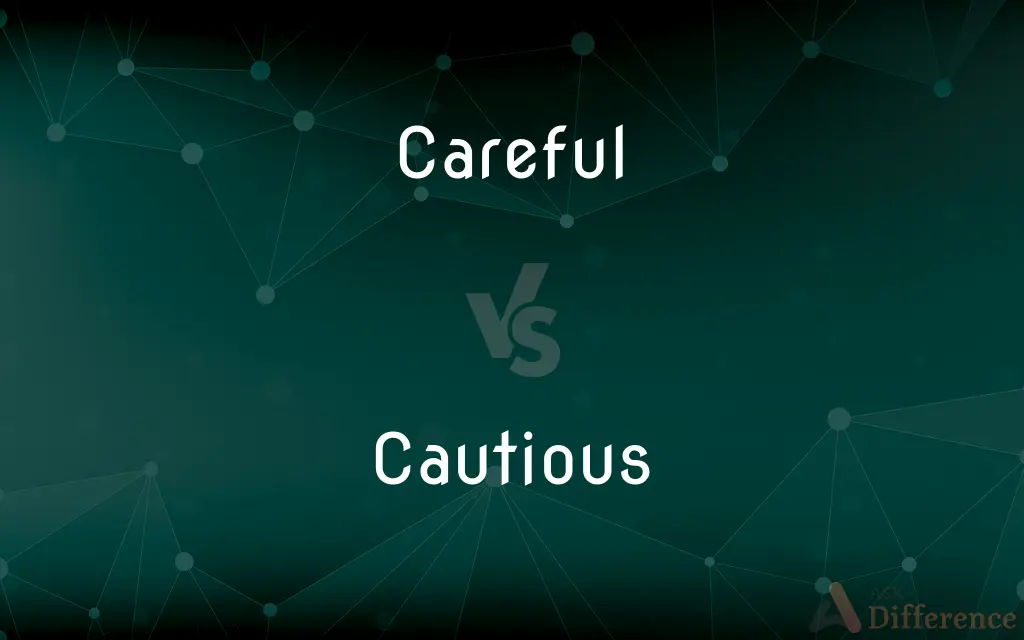Careful vs. Cautious — What's the Difference?
By Tayyaba Rehman — Published on August 29, 2023
"Careful" implies being attentive to avoid harm or mistakes, while "cautious" suggests a deliberate avoidance of potential dangers.

Difference Between Careful and Cautious
Table of Contents
ADVERTISEMENT
Key Differences
"Careful" and "cautious" are terms often used interchangeably, yet they bear nuanced differences in their implications. "Careful" typically refers to being attentive and ensuring accuracy or avoiding harm. For instance, someone might be "careful" when measuring ingredients for a recipe to ensure the dish turns out well. On the other hand, "cautious" implies a level of wariness about potential risks or dangers, like a person being "cautious" when walking on icy pavement to avoid slipping.
Both "careful" and "cautious" convey a sense of mindfulness, but they manifest differently in actions. When someone is "careful" while painting, they are paying attention to details, avoiding going outside the lines, and ensuring an even application. In contrast, a "cautious" painter might be wary of using certain chemicals or paints, knowing their potential hazards.
From a linguistic standpoint, "careful" is often employed to highlight precision and attention to detail. This could be in tasks such as editing a document, where one needs to be "careful" about typos. "Cautious," meanwhile, is utilized more in scenarios where there's an understanding of the broader risks involved, like being "cautious" about sharing personal information online.
Context plays a significant role in determining the use of "careful" versus "cautious." For example, telling someone to be "careful" when holding a delicate object emphasizes the fragility of the item. However, advising someone to be "cautious" when approaching a wild animal emphasizes the potential danger posed by the creature.
Comparison Chart
Primary Implication
Precision and attention to detail
Wariness of potential risks or dangers
ADVERTISEMENT
Context of Use
Handling delicate items, tasks requiring accuracy
Situations with inherent risks
Degree of Avoidance
Avoidance of mistakes or harm
Deliberate avoidance of potential dangers
Related Emotion
Concentration, meticulousness
Wariness, apprehensiveness
Example Scenario
Measuring ingredients, editing a document
Walking on icy pavement, approaching a wild animal
Compare with Definitions
Careful
Paying close attention to detail.
She was careful while painting the intricate design.
Cautious
Taking care to avoid potential danger or risks.
She's always cautious when hiking in unfamiliar areas.
Careful
Ensuring safety and protection.
Always be careful when crossing the street.
Cautious
Characterized by a desire to avoid pitfalls or mistakes.
He's cautious about making investments without thorough research.
Careful
Acting to avoid potential mistakes or harm.
He was careful when handling the fragile vase.
Cautious
Being reserved or conservative in actions or decisions.
She's cautious in her approach to new business ventures.
Careful
Being wary of consequences.
She gave a careful response to the controversial question.
Cautious
Avoiding potential harm or negative consequences.
Be cautious about sharing personal information online.
Careful
Characterized by thoroughness and precision.
The careful research led to groundbreaking findings.
Cautious
Acting with deliberation in potentially hazardous situations.
He drove cautiously through the storm.
Careful
Attentive to potential danger, error, or harm; cautious
Was careful when crossing the street.
A careful answer.
Cautious
Tentative or restrained; guarded
Felt a cautious optimism that the offer would be accepted.
Careful
Conscientious and painstaking; meticulous.
They made a careful search of the crime scene.
Cautious
People who are fearful and cautious;
Whitewater rafting is not for the timid
Careful
Making sure of avoiding potential danger, mishap, or harm; cautious
Be careful not to lose her address
I begged him to be more careful
Cautious
Unwilling to take risks
Careful
Done with or showing thought and attention
A careful consideration of the facts
Cautious
Showing or practicing caution; careful.
Careful
Thorough and painstaking in action or execution; conscientious
A careful search.
Careful art restorers.
Cautious
Using or exercising caution; careful; tentative
He took a few cautious steps toward the cave.
Careful
Protective; solicitous
Be careful of his feelings.
Cautious
Attentive to examine probable effects and consequences of acts with a view to avoid danger or misfortune; prudent; circumspect; wary; watchful; as, a cautious general.
Cautious feeling for another's pain.
Be swift to hear; but cautious of your tongue.
Careful
Full of cares or anxiety
"Thou art careful and troubled about many things" (Luke 10:41).
Cautious
Showing careful forethought;
Reserved and cautious; never making swift decisions
A cautious driver
Careful
Taking care; attentive to potential danger, error or harm; cautious.
He was a slow and careful driver.
Be very careful while trekking through the jungle.
Cautious
Avoiding excess;
A conservative estimate
Careful
(obsolete) Full of care or grief; sorrowful, sad.
Cautious
Cautious in attitude and careful in actions; prudent;
A cautious answer
Very cautious about believing everything she was told
Careful
(obsolete) Full of cares or anxiety; worried, troubled.
Careful
Full of care; anxious; solicitous.
Be careful [Rev. Ver. "anxious"] for nothing.
The careful plowman doubting stands.
Careful
Filling with care or solicitude; exposing to concern, anxiety, or trouble; painful.
The careful cold beginneth for to creep.
By Him that raised me to this careful height.
Careful
Taking care; giving good heed; watchful; cautious; provident; not indifferent, heedless, or reckless; - often followed by of, for, or the infinitive; as, careful of money; careful to do right.
Thou hast been careful for us with all this care.
What could a careful father more have done?
Careful
Exercising caution or showing care or attention;
They were careful when crossing the busy street
Be careful to keep her shoes clean
Did very careful research
Careful art restorers
Careful of the rights of others
Careful about one's behavior
Careful
Cautiously attentive;
Careful of her feelings
Heedful of his father's advice
Careful
With care and dignity;
Walking at the same measured pace
With all deliberate speed
Careful
Full of cares or anxiety;
Thou art careful and troubled about many things
Careful
Mindful of the future in spending money;
Careful with money
Common Curiosities
When should I use "careful" instead of "cautious"?
Use "careful" to emphasize precision and attention, and "cautious" to emphasize wariness of risks.
Can "careful" and "cautious" be used interchangeably?
While sometimes used interchangeably, they have nuanced differences, with "careful" focusing on attention to detail and "cautious" on avoiding risks.
Is being "careful" always about avoiding mistakes?
Primarily, yes. "Careful" often implies acting with attention to avoid errors or harm.
Does "cautious" always imply danger?
Not always. "Cautious" can imply potential risks or negative outcomes, not necessarily immediate danger.
How is "careful" used in a context of communication?
In communication, being "careful" can imply choosing words or responses thoughtfully to avoid misunderstandings or offense.
Is "cautious" always about being wary?
Largely, yes. "Cautious" implies a deliberate approach to avoid potential dangers or pitfalls.
Can businesses be described as "careful" or "cautious"?
Yes. A "careful" business might emphasize detail and precision, while a "cautious" business might be risk-averse or conservative in its strategies.
Which word, "careful" or "cautious," implies a greater sense of danger?
"Cautious" often carries a stronger implication of potential danger or risks.
Can a person be described as naturally "careful" or "cautious"?
Yes. Some people are inherently more meticulous (careful) or risk-averse (cautious) in their disposition.
How do I decide between "careful" and "cautious" when writing?
Consider the context: if emphasizing attention or precision, choose "careful"; if emphasizing the avoidance of risks or dangers, choose "cautious."
Share Your Discovery

Previous Comparison
Nevertheless vs. However
Next Comparison
Desperate vs. PerseverantAuthor Spotlight
Written by
Tayyaba RehmanTayyaba Rehman is a distinguished writer, currently serving as a primary contributor to askdifference.com. As a researcher in semantics and etymology, Tayyaba's passion for the complexity of languages and their distinctions has found a perfect home on the platform. Tayyaba delves into the intricacies of language, distinguishing between commonly confused words and phrases, thereby providing clarity for readers worldwide.















































